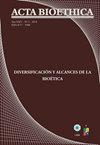Midwife and Nurse Students’ Perceptions of Body Privacy and Self Esteem. The Case of Turkey
IF 0.3
4区 哲学
Q4 ETHICS
引用次数: 0
Abstract
Abstrac t: The article reports the results of a study conducted to examine midwifery and nursing students’ perceptions of body intimacy and the factors affecting their perceptions. This was a cross-sectional study, with 389 midwifery and nursing students at a public university volunteering to participate in the study. Data were collected using a “Personal Information Form”, the “Body Confidentiality Scale for Obstetrics and Gynecology” and the “Rosenberg Self-Esteem Scale”. The participants had a mean age of 20.89 ± 1.86 years. The mean score they gave to the question whether they paid attention to privacy was 8.21 ±1.88. The mean Rosenberg self-esteem score was 29.44 ± 4.83 (minimum = 10, maximum = 40). The mean overall privacy score was 36.10 ± 6.84 (min = 9, max = 45), rights and privacy was 20.80 ± 3.71 (min = 5, max = 25), ethics and privacy was 20.45 ± 3.67 (min = 5, max = 25), and clinical privacy was 75.22 ± 12.33 (min = 18, max = 90). According to the results, obstetrics and nursing students, who would later intervene in women’s health, had higher than average self-esteem and perception of privacy. Nevertheless, the establishment of the concept of “privacy” is an issue that should be addressed and reinforced in the training of obstetrics and nursing students who will provide services in such a sensitive field as gynecology and obstetrics.助产士和护生对身体隐私和自尊的认知。土耳其案例
摘要/ abstract摘要:本研究旨在调查助产与护理专业学生对身体亲密关系的认知及其影响因素。这是一项横断面研究,一所公立大学的389名助产学和护理学学生自愿参加了这项研究。数据采用“个人信息表”、“妇产科身体保密量表”和“Rosenberg自尊量表”收集。参与者的平均年龄为20.89±1.86岁。在“是否注意隐私”一题中,平均得分为8.21±1.88分。平均Rosenberg自尊得分为29.44±4.83(最小值为10,最大值为40)。平均总体隐私得分为36.10±6.84分(min = 9, max = 45),权利与隐私得分为20.80±3.71分(min = 5, max = 25),道德与隐私得分为20.45±3.67分(min = 5, max = 25),临床隐私得分为75.22±12.33分(min = 18, max = 90)。结果显示,产科和护理专业的学生,后来会干预妇女的健康,有高于平均水平的自尊和对隐私的感知。然而,“隐私”概念的确立是产科和护理专业学生在妇产科等敏感领域提供服务的培训中应该解决和加强的问题。
本文章由计算机程序翻译,如有差异,请以英文原文为准。
求助全文
约1分钟内获得全文
求助全文
来源期刊

Acta Bioethica
Bioethical Issues-
CiteScore
0.40
自引率
0.00%
发文量
22
审稿时长
12 weeks
期刊介绍:
Acta Bioethica is a biannual publication by the Interdisciplinary Center for Studies in Bioethics of the University of Chile (ISSN 0717-5906, press edition, y 1726-569-X, electronic edition), which publishes in three languages: Spanish, English and Portuguese.
Indexed in Science Citation Index (SCI), Scopus, Lilacs, SciELO y Latindex, and in database from several Institutions; it constitutes a pluralistic source of perspectives and an important tribune which accepts the contributions of authors compromised with the interdisciplinary study of ethical determinants and consequences of techno scientific research.
 求助内容:
求助内容: 应助结果提醒方式:
应助结果提醒方式:


